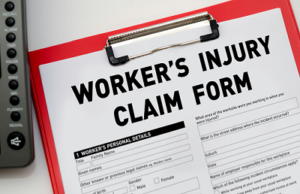Workers’ compensation insurance can seem confusing and elaborate when businesses start hiring their first employees. Even after years of experience, some human resource professionals and business owners encounter unique workers compensation cases that force them to learn new information.
The following definitive guide to workers’ compensation attempts to give you all the information you need to understand how worker’s comp insurance works at the federal and state levels.
Keep in mind that no guide can answer every question about worker’ compensation. It often helps to hire a Professional Employment Organization (PEO) with ample experience:
- Reviewing records.
- Investigating incidents.
- Maintaining reserve money to pay claims.
- Reimbursing employees who file eligible claims.
- Providing workplace safety training that helps lower risk and prevents workplace injuries.
A PEO can act as your human resources department. Instead of hiring expensive HR professionals for an internal department, outsource the needs to a company that can give you the right services while helping you save money.
Before you make any decisions, you need to know the basics of insurance that protect workers. Then, you can take a deeper dive to explore the nuisances of how state laws will affect your business.
Jump to the content using the following links:
- Workers Compensation Active Claims Management Reporting
- Workers Compensation Claims Premium Forecasting
- Workers Compensation Experience Mod Verification
- Workers Compensation Policy Endorsements
- Workers Compensation Post-Accident Drug Testing
- Getting and Comparing Workers Compensation Premium Quotes
- Worker Adjustment and Retraining Notification Act
Learning the Basics of Workers’ Compensation
For now, let’s avoid worker’s compensation requirements in specific states. The basics of worker’s compensation look the same in most states, anyway, so you can learn a lot from an overview of what the program generally does and does not cover.
What Injuries or Accidents Does Workers Compensation Usually Cover?

Workers compensation insurance claims get reviewed on a case-by-case basis. To create a list of every accident or injury that will lead to a successful claim is difficult. The question comes down to what counts as a workplace injury or illness.
Typically, you can expect workers’ comp to pay for:
- Repetitive stress injuries (also known as overuse injuries) occur when an employee repeatedly performs the same movement throughout the workday, such as typing and lifting heavy boxes. Overuse injuries are common among office workers, manual laborers, and healthcare professionals.
- Occupational illnesses caused by exposure to unhealthy materials like coal dust and asbestos on the worksite.
- Injuries that take place in areas that lack appropriate signage and personal protective equipment (PPE). Signage and PPE is required by laws and regulations enforced by the Occupational Safety and Health Administration (OSHA).
- Stress and other psychological disorders caused in part by traumatic experiences on the job.
- Hearing loss induced by working in extremely loud environments such as construction sites and factories.
Any type of employer negligence makes it easier for employees to file successful workers’ compensation claims. Perform regular safety reviews to ensure you give your employees the equipment and training they need to avoid injury.
What Injuries or Accidents Are Not Usually Covered by Workers’ Compensation Insurance?
Even if someone gets injured in the workplace, they may not get coverage from worker’s compensation insurance. Insurance claims usually get rejected when:
- A test reveals the presence of drugs or alcohol in the employee’s system.
- The injuries are self-inflicted, such as by participating in a fight or getting hurt intentionally.
- The employee gets injured while committing a serious crime, such as assaulting someone on the property or stealing from the company.
- An employee receives an injury outside the person’s working hours.
- The injuries occurred because the employee did not follow company policies, especially policies created to improve safety in the workplace.
Who Oversees Workers’ Compensation Insurance and Rights?
Many people believe that the U.S. Department of Labor oversees workers’ compensation insurance and rights. In reality, the Department of Labor oversight mostly applies to federal employees. However, the department’s Office of Workers’ Compensation Programs (OWCP) does work in coordination with state regulators.
Each state has its own regulatory department that establishes rules and makes decisions about whether employees deserve compensation. The rules differ somewhat between states, but most follow the list of covered and uncovered injuries above.
For more information about your state’s regulatory department, visit the Division of Federal Employees’ Compensation (DFEC) State Workers’ Compensation Officials page and select your state. The link will lead you to your state’s regulatory body.
Workers Compensation Active Claims Management Reporting

Filing out workers’ compensation forms can take a lot of time. The process varies from state to state, but every area has a burdensome process that requires submitting multiple forms. For example, workers’ compensation forms in California include:
- Complaint Form: Audit Unit
- Complaint Form: Medical Provider Network
- Complaint Form: Qualified Medical Evaluator
- Complaint Form: Utilization Reviewing
- Employer’s Report of Occupational Injury or Illness
- Application for Independent Medical Reviewing
The list grows considerably longer when the claim goes to court.
Large corporations with HR departments hire professionals trained to report and manage workers’ compensation claims. Small- to medium-sized businesses don’t always have the resources to pay for in-house HR professionals with the knowledge to accurately complete and process claims.
The Burden of Reporting and Managing Workers’ Compensation Claims
An injured employee has the right to file an insurance claim for compensation. You cannot deny that right. Most employers want to make sure that their workers receive the compensation that they deserve, so they don’t mind filling out a few forms. Until you entire the workers’ compensation system, you have no idea how much work a claim may require.
Most states say that they require insurance companies to make decisions within 30 days of receiving workers’ compensation paperwork. Unfortunately, the insurance companies can ask for extensions. They often get extensions that allow them to conduct additional inspections. It makes sense for an insurance company to deny claims as often as possible. They earn money by collecting premiums. Paying insured workers lowers their overall profits.
If your insurer denies the claim, you can usually appeal the decision. In sever cases, it can take up to a year for employees to get the compensation they deserve.
Imagine going back and forth with your insurance company, your state government, and a judge to give your employee deserved compensation for a workplace injury. Small business owners rarely have the time and resources to manage the process.
Outsourcing to a PEO Lowers Your Workers’ Comp Burden
Outsourcing your workers’ compensation active claims managing and reporting to a Professional Employment Organization eliminates much of the burden. Instead of doing the work on your own and risk compliance issues, you can get the specific services that you need from a PEO. PEOs manage hundreds or thousands of workers’ compensation claims more effectively than smaller teams.
Workers’ Compensation Certificate of Insurance

Unless you live in Texas, which does not require all employers to carry workers’ compensation insurance. You should get a certificate of insurance that proves you have an appropriate level of coverage.
Most companies aren’t required to keep their workers’ compensation certificates of insurance on file. It’s enough to have a workers’ comp insurance policy.
Having a certificate of insurance, however, comes in handy for many types of businesses. For example, many companies will not hire subcontractors that cannot provide a workers’ compensation certificate of insurance that lists:
- The name of the insurer.
- The name of the policyholder.
- The insurance policy number.
- The policy’s effective dates.
- The policy period.
If you cannot provide a certificate to companies, few will hire you to do work. Bringing you and your employees onto a worksite could expose the company to liability issues. If you don’t have a policy, then the company may be held responsible. Even if the company isn’t forced to provide benefits, it will need to spend time and money consulting with lawyers. Since no one wants the potential responsibility, they will not hire your company for subcontracting work.
Meet with and ABO professional today to learn how we can help you excel with our turn-key solutions.
Workers’ Compensation Claims Premium Forecasting
Filing a workers’ compensation claim can increase your premiums. The more claims your employees file, the more you can expect your premiums to increase. Expensive claims may also force your worker’s compensation premiums higher. The more money insurance companies spend on you and your employees, the more they will charge to offset the risk of lower profits.
Some employers try to deny claims, so they can keep their insurance payments as low as possible.
Workers’ compensation claims premium forecasting helps you determine how much your premiums will increase after someone files a claim. It’s a complicated process that requires studying numerous factors, such as:
- How many employees work for you.
- The injury rates in your industry.
- The effectiveness of your safety training program.
- Whether you follow or exceed OSHA regulations that make workplaces safer.
- How many workers’ compensation claims employees have filed in the past.
- How much medical expenses and lost wages will likely cost the insurance company.
Unless you have years of experience working with the insurance industry, it’s practically impossible to estimate premium increases.
Straightforward Answers
Insurance companies will not give you straightforward answers about rate increases. You can ask for help, but you won’t get useful answers.
It makes sense to have your professional employer organization review your worksite, insurance history, training program, and workforce to estimate premiums increases after filing claims.
In addition to workers’ compensation claims premiums forecasting, you can ask your PEO to improve your labor law compliance, safety training, and safety equipment. The safer you make your workplace, the less likely it is that your employees will need to file claims. Improved safety can also lower the amount of money that they need after getting hurt on the job. If your insurance company doesn’t have to spend much money on medical treatments, lost wages, and occupational training, your premiums may not increase much.
Coverage Renewal Process Management for Workers’ Compensation Policies

A business’s workers’ compensation needs can change from year to year. It adds more employees, opens new locations, and adapts to legal requirements. Even small changes can have a significant impact on how many companies pay for their policies.
At least once per year, businesses should review their current workers’ compensation policies to determine whether they have the correct coverage level. Too much coverage likely means that you’re spending more money than necessary. Too little coverage could mean that you get held responsible for medical pays and lost wages when an employee gets injured.
Your current policy should have a declarations page that lists important information, including the names of your covered workers, their annual pay, and their job classifications. If any of that information has changed, then it makes sense to have a professional review of your policy and request price quotes.
Anything outside the perfect amount of coverage will cost you additional money, so you must prioritize.
Workers’ Compensation Experience Mod Verification
Many small businesses don’t have HR professionals with enough knowledge to see the potential cost-savings of workers’ compensation experience mod verification.
Workers’ compensation experience modification factors show how much your business pays compared to what similar enterprises pay. Ideally, you want an Experience Mod of 1.00, which means you’re paying the industry average for business.
If your company files fewer workers’ compensation claims than expected, you should expect to spend less on your policy. For example, you might have an Experience Mod of 0.75, which shows that you had fewer claims than other businesses like yours. Knowing the modification helps ensure that you get a credit that applies to future premiums. You may, for instance, discover that your premiums fall from $100,000 to $75,000.
Experience Mod verification can also lead to increased payments when they have an unsafe workplace where employees get injured more frequently than expected. In that case, you can expect your premium to increase.
Considering that your premium could change by thousands of dollars per year, you should hire a professional with years of experience verifying policies, premiums, and claims. Even a slight dip in workers’ comp claims could save you thousands.
Payroll Reporting for Workers’ Compensation

Payroll plays a crucial role in how much money businesses spend on workers’ compensation insurance policies. The more your employees earn, the more wages your insurance provider will need to replace while recovering from injuries or illnesses.
All business owners know that payroll can create unexpected burdens. The simplest mistake can mean that you spend too much or too little on payroll taxes. Hiring new employees also means that you need to update your payroll information. If you have a high churn rate, someone in your organization spends a lot of time keeping the payroll accurate.
Payroll reporting for workers’ compensation, taxes, and other requirements doesn’t have to cost you a lot of time and money. An IRS Certified Professional Employment Organization can handle all the work for you.
Frequent payroll reporting makes sure that you spend the correct amount on your workers’ compensation insurance. By outsourcing to an IRS CPEO, you get the added benefit of lowering your liability. If payroll taxes don’t get deducted correctly, the IRS will hold the CPEO responsible. You don’t have to worry about the government going through your records or sending you finds for non-payment.
America’s Back Office is the only IRS CPEO based in Michigan. Michigan businesses can get distinct advantages by choosing ABO for payroll processing and workers’ compensation insurance services. ABO also has offices available to serve companies throughout the United States.
Workers’ Compensation Policy Endorsements
Workers’ compensation policy endorsements make changes to existing policies. They modify your current policy to comply with new regulations, add employees, subtract employees, or change service terms.
The workers’ compensation policy endorsements that your business needs often depend on your location. For example, you may need to get a policy endorsement when your state updates its workers’ compensation requirements. In many cases, you can simply add the new language to the existing contract. When government regulations require changes, insurance companies already expect you to request policy endorsements.
You may also need a workers’ compensation policy endorsement when you accept a contract that puts your employees in a new environment. Accepting a government contract to construct a building, for instance, may require additional coverage. Without the policy endorsement, the government may not hire you for the job.
Subcontractors may also need workers’ compensation policy endorsements as they grow into new areas of their industries. The policy that covers your employees while working in your warehouse may require a policy endorsement when you contract them to work for a different business, travel to a new warehouse, or begin operating new machinery.
Workers’ compensation policy endorsements play a crucial role in protecting your business and employees. Review your coverage often to make sure it aligns with the requirements of your current and planned jobs. If you have any uncertainty, contact a PEO that can have a workers’ compensation expert look over your policy’s details and recommend changes for your policy endorsement.
Review Workers’ Compensation for Accurate Class Codes

Class codes play a part in determining the cost of your workers’ compensation policy. You need to review workers’ compensation class codes for accuracy to ensure you have the right coverage and pay the correct amount.
Depending on your industry, location, and the size of your workforce, reviewing class codes can become a severe burden. Most states use the codes established by the National Council on Compensation Insurance (NCCI). Unfortunately, other states choose to use independent systems. If you have a business with locations in multiple states, you may need to review thousands of codes for accuracy.
States that do not use the NCCI class codes include:
- North Dakota
- Ohio
- Washington
- Wyoming
Other states use a mixture of NCCI and independent class codes, which can create confusing situations for businesses that want the right level of insurance coverage. States with independent job class codes include:
- California
- Delaware
- Massachusetts
- Michigan
- New York
- North Carolina
Accuracy Affects Coverage and Cost
Why do class codes matter so much? Mostly because they describe a job’s main tasks and how many workers’ compensation will cost. If you choose the wrong class code, you could discover that you don’t have the coverage that you expected. Unfortunately, making a small mistake could mean that you have to spend thousands of dollars paying for a hurt employee’s medical bills and lost wages.
Class codes provide more information than how many workers get paid. They also include statistics about how often people get hurt on the job. A farm worker who grows and delivers flowers might earn the same amount of money as a farm employee who plants and delivers trees. Since people working with trees get injured more often than people growing flowers, the class code for forestry is hundreds of dollars higher.
If you tried to save money by listing a tree planter as a florist, you probably wouldn’t get the coverage needed when the person gets injured on the job. Suddenly, the few hundred dollars you saved using the wrong class code can cost you thousands of dollars in workers’ comp that comes out of your pocket.
Have Professionals Review Class Codes for Accuracy
Ensuring the accuracy of workers’ compensation class codes is an essential part of running your business. Since it’s often difficult, you can outsource accuracy projects to professionals who focus on workers’ compensation insurance. They know how to identify mistakes quickly to make sure you have the right class codes and coverage.
Considering how much a mistake can cost, it makes sense to hire someone you trust to do the job correctly. By outsourcing, you may also shift some of your liability to the service provider. Instead of paying out-of-pocket for an employee’s care and wages, you can put the blame on the PEO that made the mistake. Let their professional liability insurance pay for it.
Workers’ Compensation Post-Accident Drug Testing

Drug testing often takes place after a workplace accident. Employers don’t want to get held responsible for higher workers’ compensation premiums because someone came to work intoxicated.
Some lawyers have worried that post-accident drug testing violates the rights of employees. Indeed, drug tests don’t always give effective results. For example, cannabis compounds can stay in a person’s system for several weeks. Drug tests that return positive results don’t necessarily mean that the employee was intoxicated on the job.
Getting 100% accurate results can mean less than deciding whether someone created a risky situation. OSHA has addressed this issue by saying that drug tests aren’t prohibited as long as the employer doesn’t violate the Improve Tracking of Workplace Injuries and Illnesses rule.
What does that mean? OSHA doesn’t think that all employers should administer post-accident drug tests. If you believe that intoxication played a role in the accident, you should have the employee take a test as soon as possible.
Insurers May Require Post-Accident Drug Tests
In some cases, you may not get to decide whether your employees take drug tests after workplace accidents. The insurance company may require a post-accident drug test. If the drug test receives a positive result, then the insurer may deny workers’ compensation.
You may not want to interfere in the personal lives of your employees. Then again, you don’t want their workers’ compensation claims to get rejected for casual drug use.
You can protect your business and your employees by making sure everyone understands the expectations. If your insurance provider requires post-accident drug tests – and it probably does – you should make sure your employees know that they take a significant risk by using drugs during their off-hours.
You may also want to provide access to drug and alcohol education resources. If someone on your staff has a substance abuse problem, they’re more likely to have an accident. If you can address the situation before it causes trouble, you may protect yourself from lawsuits that can protect your employees from losing their livelihoods.
Workers’ Compensation Audits – Supervised & Verified

Insurance companies perform workers’ compensation audits to ensure that they get paid the right amount for the risk they assume by selling business policies. During supervised and verified workers’ compensation audits, you may need to give the insurance company access to relevant information.
The policy provider will want to see your payroll to make sure it charges you the right premium. Assuming that your current payroll amount matches the number you gave the insurer, you probably don’t have anything to worry about.
The insurance company’s auditor will, however, look at a few more items. The auditor will likely look at your employee class codes. If your class codes do not match the jobs your employees perform, then the auditor will update the records. An audit that changes your job classification codes could lead to increased or decreased premiums. Auditors shouldn’t look for reasons to charge you higher prices. They just need to verify accuracy. If an incorrect item leads to a lower premium, honest companies will adjust it to match reality.
Types of Audits Performed by Workers’ Compensation Policy Providers
An in-person audit costs insurance companies quite a bit of time and money. Auditors get paid well-to-do extremely accurate work. Insurance companies, therefore, often use various types of audits to verify your information.
Workers’ Compensation Field Audits
A field audit involves sending someone to your office to review documents in person. Once they have the information, the auditor usually leaves to calculate premiums remotely. If the company needs to change your premium, someone will contact you.
Telephone Audits for Workers’ Compensation
Telephone audits require less effort from the insurer. They will send you a document to complete. At a later date, an auditor will call to confirm your information and ask additional questions.
Preliminary Workers’ Compensation Policy Audits
An on-site audit that the insurance company uses to determine your first policy premium. The information gathered during the audit helps establish your premiums, risks, and coverage options.
Test Audits for Workers’ Compensation Insurance
States have their own insurance auditors who test the accuracy of the information collected and provided by insurance companies. During a test audit, someone from your state will review your payroll, documents, and other information. They will pay special attention to the size of your payroll and class codes.
Preparing for a Workers’ Compensation Audit
Any type of audit can feel stressful. Keeping your records in order will help ease tension and make it easier for the auditors to do their jobs.
Small business owners don’t always have time to run their businesses and keep careful records. Hiring a bookkeeper might seem like a good solution, but you often spend a lot of money for limited services. You can get more for your money by having a PEO manage your payroll and other HR tasks.
Getting and Comparing Workers’ Compensation Premium Quotes

Dozens of companies sell workers’ compensation policies in the United States. Like any type of insurance, though, you want to do some research to make sure you get the most coverage for the lowest amount of money.
Requesting workers’ compensation premium quotes will give you most of the information that you need to start comparing offers.
If you plan to compare premiums on your own, start by requesting quotes from companies like:
The insurance providers will want several pieces of information before they give you premium quotes. Prepare to answer questions like:
- How many employees do you have?
- How many workers’ compensation claims have you filed in the last five years?
- How many locations does your business operate?
- Do any of your employees operate potentially dangerous machinery?
- Do your employees ever use company vehicles to deliver items?
- What is the overall size of your payroll?
- What insurance providers have you used before?
It may seem like insurance companies ask a lot of questions. The more information they have, though, the more accurate your premium quote will be. Answer the questions as accurately as possible so you can compare quotes correctly.
Compare Workers’ Compensation Reviews as Well as Quotes
The cheapest workers’ compensation insurance policy isn’t always the best option. You want to spend as little as possible on your insurance premiums. Then again, you don’t want to buy policies from a company that doesn’t put its clients first.
Getting inexpensive workers’ compensation policy for as little money as possible may satisfy your legal requirements. But it may also mean that your employees don’t get paid on time. Insurers may even cut their prices by providing poor client services. If you have to spend hours on the phone arguing with a policy representative, you will wish that you had chosen the slightly more expensive policy that would have given you excellent client support.
Talk to Someone With Experience Before Choosing a Workers’ Compensation Policy
No insurance provider will tell you that they offer terrible client services, so you need someone with experience. Since PEOs do so much work in human resources, they often have in-depth knowledge about the workers’ compensation policy providers that serve your area.
Reach out to a PEO to talk about your insurance options. A brief consultation could help you choose a high-value insurance provider that gives you better service at an affordable rate.
Workers’ Compensation Review of Claims Reserves and Payments

Workers’ compensation insurance has to pay a variety of expenses connected to medical treatment, time off work, and potential legal fees. No one knows precisely how much a claim will cost until the person gets healthy and returns to work. Still, insurance companies need to know approximately how much they can expect to spend. They call this amount a claims reserve.
A claims reserve is exactly what it sounds like: an amount of money reserved to pay for a claim. A higher claims reserve usually means that you will pay a higher premium. The insurers, after all, need to protect themselves from potential losses.
How Insurers Set Claims Reserves
When establishing claims reserves, insurers look at a long list of expenses that include:
- Hospitalization.
- Diagnostic testing.
- Medicines.
- Specialist care.
- Temporary disability.
- Permanent disability.
- Death benefits.
- Vocational rehabilitation.
- Court costs.
- Defense attorneys.
- Expert witnesses.
This just scratches the surface of items that insurance companies consider.
Your claims reserve gets set by looking at the average cost of accidents that happen at businesses like yours. Everything from your industry to your location can affect your claims reserve amount. If you own a small boutique in a quiet suburb, you will probably have a low claims reserve. If you own a factory in an area with frequent storms or earthquakes, you will likely have a much higher claims reserve.
Claims reserves aren’t always the same from insurer to insurer. Like premiums, they differ depending on the insurance company that you choose.
Talk to a PEO with expertise in workers’ compensation claims reserves. They can help you determine what an adequate amount looks like, where to find an affordable option, and what you can expect once you pay for a policy.
Worker Adjustment and Retraining Notification Act (WARN)
The Worker Adjustment and Retraining Notification (WARN) Act was passed in 1988 and updated as recently as 2013. The act requires companies with 100 or more employees to provide at least 60 days advanced notice before closing locations or laying off workers. Notifications must go to local officials, state officials, and employee representations, such as unions.
By giving at least 60 days advanced notice, employees can enroll in training programs that teach them new skills. Ideally, this helps workers develop the skills that they need to find new jobs.
How America’s Back Office Can Help With Workers’ Compensation Insurance
As an employer, you must carry workers’ compensation insurance. Choosing the right policy benefits your employees by giving them the money that they need to for medical treatments and lost wages while recuperating from an accident at work. Workers’ compensation also protects you by shifting liability from your business to the insurance company.
Finding an affordable workers’ compensation policy that protects you and your employees can feel like a daunting task. With so many options, you may not know where to start. It’s nearly impossible for a small- to medium-sized business owner to sit down and review dozens of policy options.
You do not have to decide on your own. America’s Back Office is an IRS Certified Professional Employment Organization with years of experience performing HR tasks for companies. Some of ABO’s most popular turn-key HR solutions include human resource administration, employee benefits, payroll processing services, labor law compliance, workplace safety programs, workers’ compensation, and risk management.
Few organizations have the connections and experience required to help your business choose and manage your workers’ compensation insurance needs.
Contact America’s Back Office to learn more about how an expert can help review your workers’ compensation needs, policy options, and premium quotes. After a face-to-face consultation, you can decide whether you want to outsource some of your HR tasks to ABO.


